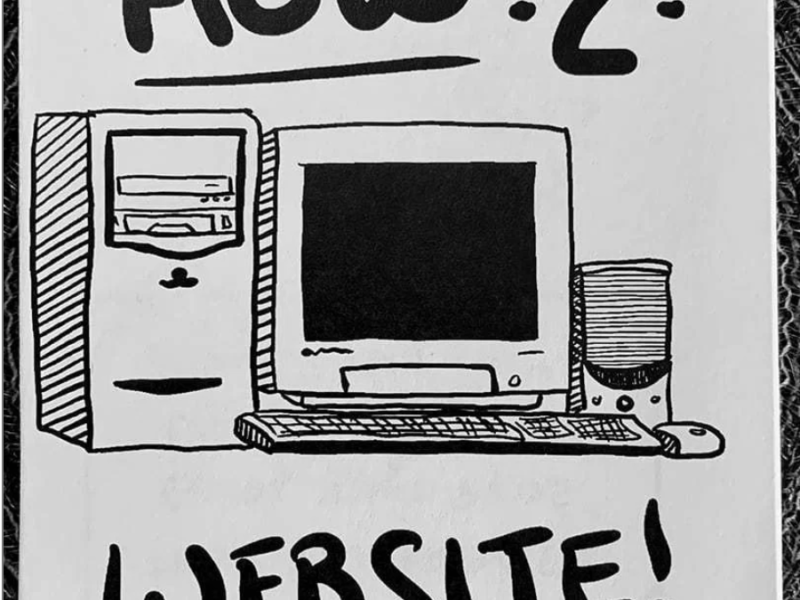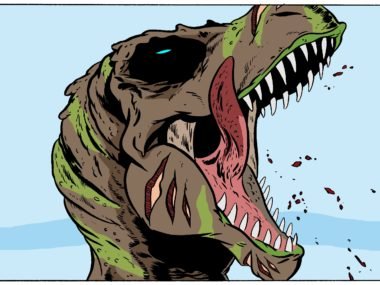No Good Zines fell in love with the art & craft of zine-making in 2018 and it’s taken over a huge chunk of his brain since then. His art style is mostly black and white illustrations, with handwritten type, but he’s working on a collaborative zine which will incorporate a bit of watercolor or ink wash possibly.
STL SPEX (Rachel): What are your artistic influences?
My artistic influences center around the forms of comics and cartoons I had access to as a kid, and that was the daily newspaper. Those worlds were a wonderful place of black and white with hash and dot shading that I’m still in love with. Even as I got older and could buy my own comics, I gravitated towards ones that had strong pencils and inks, but fairly minimal color. That’s the style I work with today, trying to use patterns and shading styles in place of color. Working within restrictions like that has always been more fun and fulfilling to me anyway, and it helps keep costs down too (which is a bonus).
STL SPEX: What are your favorite tools and how do you use them to create your work?
Although I carry sketchbooks everywhere and love to doodle with pen and pencil, all of my zine’s are done on the iPad Pro and then made print-ready on a Mac. Working digitally feels natural as I’m a UX/UI designer by trade, so my brain is already used to those tools. It also helps me get over my perfectionist fears of messing something up or somehow ruining a whole sketchbook with a badly timed fall or spill.

STL SPEX: Your zines often mix the serious and the comical (both in terms of visuals and content). Why have you chosen this format and how do you think it supports the messages/stories you’re interested in sharing?
My zine’s are like little satellites I send into space hoping to find interested aliens that hopefully aren’t hostile. Most of my work focuses on obsessions that I want to share or spark in someone else (eg: philosophy and poetry). But some of them are deeply personal… with those, I try to obscure as many details that I can to make them generic enough that others can find themselves in it. But in both cases, I’m looking for a connection with other people and zine’s are a lot easier and more fulfilling than Facebook.
STL SPEX: What happened to all the good zines?
The name “No Good Zines” was self-depreciating enough to be funny and took some of the pressure off when starting out. It’s also a phrase I heard a lot growing up, that someone or something was a “no good” whatever. You don’t hear that used as much anymore, so I guess I’m bringing it back one zine at a time. But, to get psychological for a second, I feel like everyone approaches the name differently and hopefully that initial disarming means they read the work with a more open-mind and connect on a level they otherwise wouldn’t. Maybe that’s reading into it too much, but that’s kinda my deal.

STL SPEX: Explain your interest in “retro tech,” particularly in the visuals of old equipment. (No judgment intended here, one of the members of STL SPEX organizing team owns a truly epic collection of VHS tapes)
My love for retro tech has to be related to how mechanical and hack-filled those devices were compared to our microchip-laden objects. The more you read into the backgrounds and stories of old tech, the more you find how genius their work-arounds to huge problems were. Even an old janky VCR was once the height of invention, and I love to celebrate that and remind myself (and hopefully others) that we got to the age of streaming on the backs of geniuses we take for granted daily. Also, analog artifacts are way cooler than digital ones (both in terms of devices and glitches). I especially miss the sound and physical feedback of sliding a cassette into my Walkman and hitting play. Telling Siri to start a playlist feels so hollow in comparison.
STL SPEX: Anything else you’d like to tell us about your work?
The only other thing I want to say, is that I hope people feel something when reading my work… a spark of interest in a topic they didn’t care about, a connection to someone they don’t know, or a sadistic chuckle at the pain of freelance web work… seeing that happen from across the table makes it all worth while and it’s why I connect with zine’s so much; there is no barrier to entry, you just need to bring yourself to the table and people will find you. That’s so special and I’m excited and lucky to be a part of that world.







